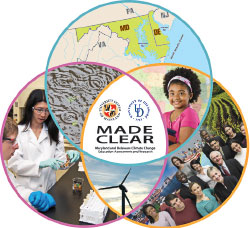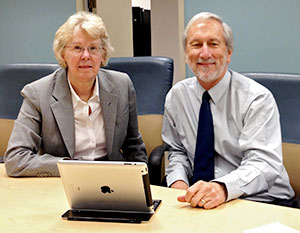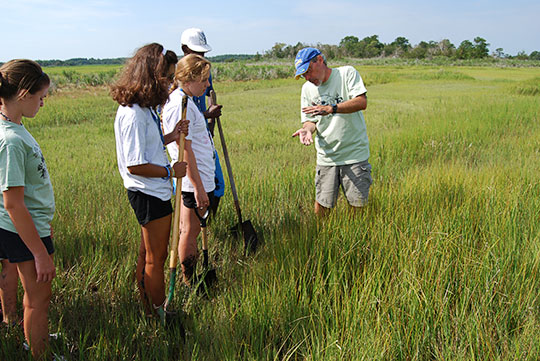


All of us—consider the infrastructure needs and costs as homes, businesses, highways, bridges and dams risk being submerged, and people are displaced; the potential impacts on the cities and historic communities that give Delaware its character; the loss of wildlife and more.

Delaware and Maryland teachers will have new resources to integrate climate change science into the classroom, thanks to a multimillion-dollar initiative funded by the National Science Foundation (NSF).
The $5.8-million cooperative agreement supports implementation of the Maryland-Delaware Climate Change Education, Assessment, and Research (MADE CLEAR) partnership, an effort to forge new ways to deliver effective, relevant climate change education in grades 8–12 that could serve as a national model.
The partnership brings together experts in climate science and education, led by the University System of Maryland and UD, to provide a support system for teachers in the two states. The network also will engage universities, state departments of education, and educators from natural resources agencies, museums and aquariums.
“MADE CLEAR will connect Maryland and Delaware students and citizens with the world in which they live by fostering a greater understanding of why the climate is changing and the consequences within our two states,” said program director Donald Boesch, president of the University of Maryland Center for Environmental Science. “Our goal is to provide a basis for our citizens, today and tomorrow, to make individual and collective choices for limiting the magnitude of climate change and adapting to its consequences.”
Climate change is a complex, sensitive topic to teach, touching on economic, social, political and scientific issues to a greater degree than most science topics. The partnership encourages scientists and educators to work together to ensure scientific objectivity and accuracy in the classroom and promote critical thinking.
Rather than introducing climate change science as a new subject in an already crowded curriculum, the goal is to integrate understanding of climate change within new science standards and environmental literacy requirements in Maryland and Delaware schools.

“As the world around us changes in many ways, it’s important that educators stay current with cutting-edge science,” said Delaware Gov. Jack Markell. “This partnership provides a way to engage and inform the teachers who will be instructing the emerging workforce for jobs of the future.”
Nancy Targett, dean of UD’s College of Earth, Ocean, and Environment, noted, “The goal is for students to emerge with better knowledge of the science behind climate-related issues. They can then better understand implications for our health, coasts, water supplies, farms and forests.”
MADE CLEAR brings together scientists from the University System of Maryland and UD, plus Delaware State University and Towson University, who are engaged in climate change research, from atmospheric physics and chemistry to ecosystem and human health effects. This expertise is already being used by state and federal governments and businesses to understand future climate change impacts on their assets, people and ecosystems.
Also key is the participation of the Maryland State Department of Education, the Delaware Department of Education, Maryland Public Television and state and federal science agencies, including the state departments of environmental and natural resources, National Aeronautics and Space Administration and National Oceanic and Atmospheric Administration.
“MADE CLEAR will support the development and distribution of teaching approaches and materials, and evaluate their effectiveness,” said Nancy Brickhouse, interim provost and professor of science education at UD. “In that way, we can strive not only for continuous improvement in our two states, but be a model for the nation.”
MADE CLEAR is one of six Phase II projects funded through NSF’s Climate Change Education Partnership (CCEP). The program’s vision is a scientifically literate society that can effectively weigh the evidence regarding global climate change as it confronts the challenges ahead, while developing the scientific workforce to advance knowledge of human-climate interactions and develop approaches for a sustainable, prosperous future.
This one-time, dedicated NSF program aims to establish a coordinated national network of regionally or thematically based partnerships devoted to increasing the adoption of high-quality educational programs and resources related to the science of climate change and its impacts.
